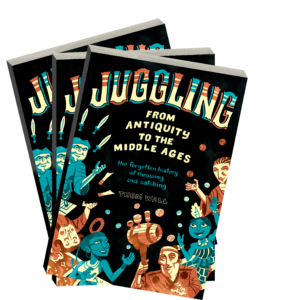Margot Meandry on “Juggling – From Antiquity to the Middle Ages”
Five Stars!
Juggling and new circus – related topics are fascinating. I am somewhat in touch with the themes because of a festival organised in Lublin, Poland. Carnaval Sztukmistrzów is its name and it’s a colourful affair – draws to the city a dozen of jugglers, buskers from around the world. The streets are their stage, allowing for a direct contact with the public and I naturally came to be interested in the topic.
I find it pretty fascinating how juggling developed so independently across so many cultures. A primal instinct, the introduction to the book suggests. Be that as it may, the book offers a fascinating catalogue of juggling instances across various cultures and time periods. I learned that Japanese pass their juggling art down to select group and there are only about a 100 artists, and that Mexican jugglers used very thick logs for foot juggling. The Spanish and Portuguese word for juggler, malabarista came to be adopted after Portuguese traders observed and came to be entertained by Indian jugglers and then transferred the word, meaning sharing the characteristics of Malabar people, to their own entertainers and there are many more interesting facts. Finally, and this is something I tend to wonder about, the discussion clearly suggests that juggler is more than someone who manipulates objects with dexterity, but, rather, someone who displayed a variety of arts. I wonder about it because it seems to me that the modern meaning of the word juggler veered towards the former. The forms of juggling were culture-specific, a lot seemed to have been used for religious rituals too. The dark side included the fact that a lot of jugglers were bought as slaves.. They were both admired, enjoyed and hated throughout history.
The author pulled a lot of primary, secondary and tertiary resources and plenty illustrations to offer an engaging and comprehensive overview of instances of early juggling across different cultures, suggesting and encouraging to dig in more. It’s a great introduction and overview and I am personally encouraged to locate and read more of the primary sources referred to in the text, it has piqued my curiosity even more.
I will want to get this book when it’s out, it’s one I consider worth keeping because it’s a fantastic reference material to refer back to regularly.
Margot Meandry is a Polish book reviewer who offers honest comments and impressions on games, books, movies, festivals and anything else that she finds inspiring.


